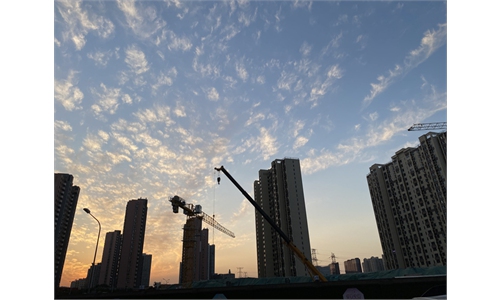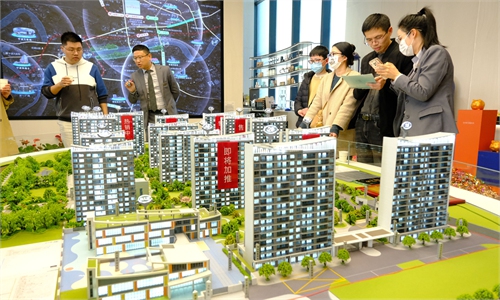
Shenzhen real estate Photo:VCG
China has been ramping up efforts to financially support debt-ridden real estate developers to ensure new home deliveries to the buyers, a move that will help improve market morale at a time when the property sector is undergoing a historical readjustment which has a close bearing on the nation's economic performance.More than 1.65 million presale homes have been delivered since the government initiative of "ensuring timely delivery of presale housing" was launched and implemented in July 2022. The hard-won achievements are expected to ratchet up market confidence in the all-important real estate sector.
Under the impact of the three-year pandemic related shutdowns and strict restrictions, China's housing market has been facing a voracious headwind and its growth has lost some of the past luster, with the declining home prices becoming the biggest headache and uncertainty weighing on prospective home-buyers and investors alike, which led to constant drops in home sales by the developers.
At the current stage, it is of great significance for the relevant authorities, the state-owned giant banks and other financiers in particular, to continue their greater supportive measures to bolster the developers and the home-buyers, paving the way for all the cities and the municipal governments to implement specific sales-reinforcing policies. Only after the home sales go up and property prices stop declining, the cash crunch faced by the developers will be resolved.
For a time, Chinese developers faced some challenges raising cash as they suffered liquidity pressure caused by stagnating home sales and a difficult refinancing environment. In 2021, the heavily indebted Evergrande Group even defaulted on paying back its loans and bonds and other obligations. The problem has derived from the developer's high reliance on debt for business expansion. Other developers have faced similar difficulties in promoting home sales and raising money.
In July, things changed. The Political Bureau of the CPC Central Committee convened an important meeting, with the top policymaking body indicating a shift toward great support for the economy, with the development of real estate sector getting highlighted. The meeting instructed local governments to effectively loosen prior controls and restrictions on home purchases and sales, which were put into place to stave off an overheated property speculation since 2010.
After the Politburo meeting, Premier Li Qiang pledged to "adjust and optimize" policies to ensure the healthy and stable development of the real estate sector. Last month, the People's Bank of China, the central bank, said it would give the developers another 12 months to repay their outstanding loans due this year. At the same time, the bank reduced the 5-year loan prime rates that translated into much lower mortgage rates for home buyers to spur property transactions.
The vast real estate industry has long been an important engine of growth for the world's second largest economy, accounting for as much as 30 percent of the China's annual GDP. So it is pivotal for the policymakers to keep abreast of the ups and downs in the property market, always coming up with the most effective supportive measures to protect the sector's healthy growth, and at the same time, be on high alert to avert the US-style subprime crisis from forming.
It is important for the home buyers to pay their mortgages. As the majority of the new homes belong to presale property, the developers, under the oversight of the government regulators, must do their best to ramp up housing construction and deliver new homes to their owners on time. Last year, after watching some developers default and fail to deliver homes, many people hesitated to buy a new home, which leads to dented public confidence in the sector.
The new package of housing market revival measures includes instructing state-owned giant banks to substantially ramp up lending to the real estate sector, while offering effective financing to enable stronger real estate developers to acquire unfinished housing projects from weaker ones, like the financially stricken Evergrande Group. The new supportive measures also allow housing developers to extend loans and bonds due in the coming six months by as long as 12 months, and privately owned developers will get the same treatment as state-owned enterprises.
Now, with the government's genuine support, new home deliveries have greatly improved. The overall "return-to-work" rate of housing projects, backed up with special supportive loans, is close to 100 percent, and the new home delivery rate has exceeded 60 percent, according to statistics released by the Ministry of Housing and Urban-Rural Development.
The completed housing space in the country increased 19 percent year-over-year to reach 339 million square meters in the first six months this year. The significant rise in the completed new hoes was owing to the smooth implementation of the government's initiatives to ensure timely housing delivery to home buyers. The promotion of the presale homes delivery has accelerated the completion of many housing projects, boosting the confidence of the home buyers and stabilizing market expectations.
Ensuring the delivery of presale apartments has become the focus of the real estate industry, and the delivery ability of the developers is crucial to win the hearts and trusts of the home buyers and the financiers alike. For instance, Sunac China delivered 133 housing projects in 62 Chinese cities for a total of 118,000 homes in the first half this year, up 31 percent year-over-year, while Greenland Group achieved overall delivery of 100,000 hoes, up 20 percent.
Along with the constant optimization of the government's preferential policies that aim to boost a virtuous cycle and healthy development of the real estate sector, indexes for property investment and housing sales have both improved. All the positive developments will likely support a soft landing for the property market, once again making the sector an important contributor to economic growth in the coming months and years.
The author is an editor with the Global Times. bizopinion@globaltimes.com.cn


